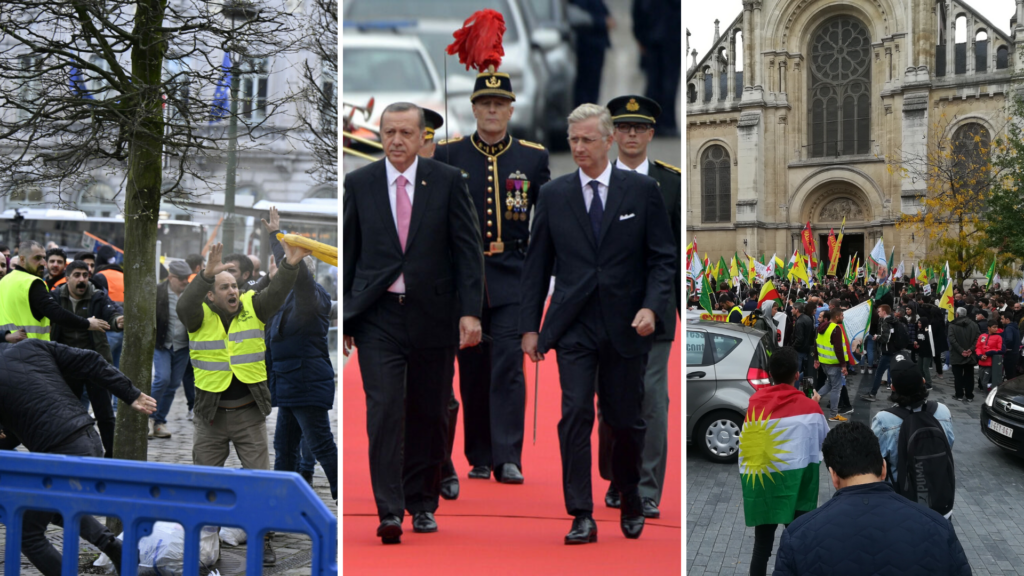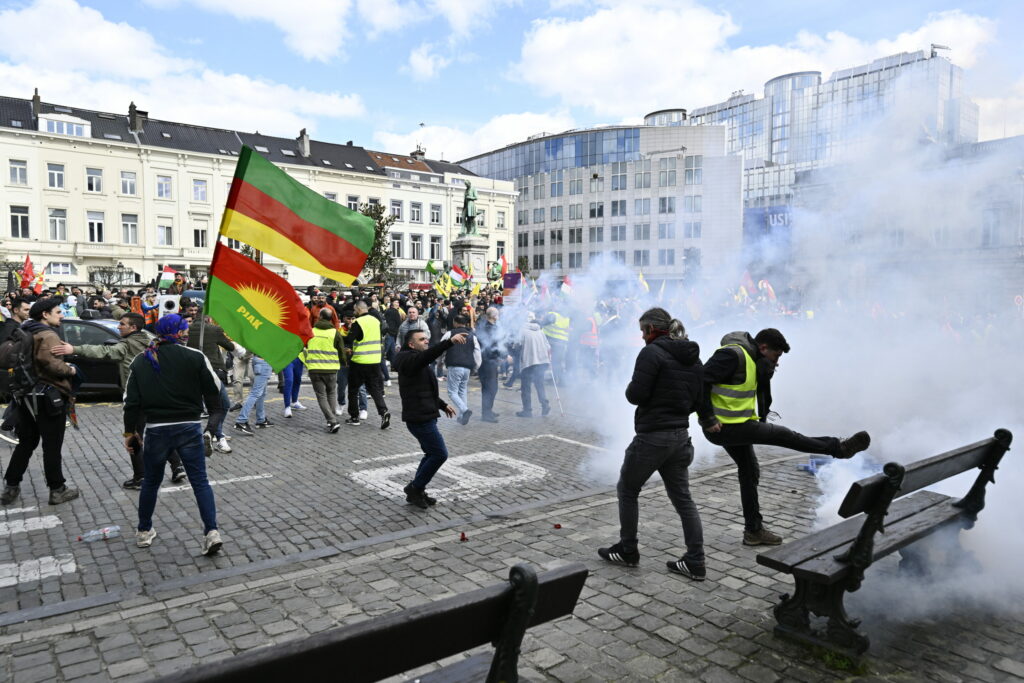Belgium might be the crossroads of Europe but those who settle here often hail from further afield, giving pockets of Brussels a distinctly extra-continental feel. In times of celebration, these neighbourhoods are a window into cultures without the typical western trappings we tend to see and a reminder of the diversity of communities that call Belgium home.
But whilst outsiders can appreciate the excitement and flavours of festivities, it is more difficult to understand the tensions that run through diasporas residing here. Belgian news has recently been punctuated by a series of incidents involving the Turkish and Kurdish communities across the country, with protests against Turkish President Erdoğan sparking brawls in Brussels.
Other outbreaks of violence have taken place across Flanders (where about half of the Belgium's Turkish community lives). Police in Ghent arrested 22 agitators on Wednesday night on suspicion of intent to target Kurds. Half of the group were minors and several of them armed. The city has subsequently imposed a ban on gatherings of ten or more people.
The intensity of the recent clashes has made them the topic of media coverage but the underlying hostility extends beyond Belgium and can be traced to rifts that have passed through generations. Turkish migration to Belgium started in the mid-60s and today numbers several hundred thousand (descendants included).
Close to 75% of Turks in Belgium favour Erdoğan, who is supported by the neofascist Grey Wolves – a far-right organisation that in Europe has orchestrated violence and vandalism against political opponents. Most notably in the latest incidents, the Grey Wolves are thought to be behind attacks on Kurdish shops and families. In particular, flags of the rival Kurdistan Workers' Party (PKK) – which has led militant efforts for Kurdish autonomy within Turkey and has been designated a terrorist organisation by both Turkey and the EU – have triggered violent outbreaks.
Exhibitions of national pride tend to present expat communities as a unified group, alike through their common strength of emotion. But when this harmony is fractured, external onlookers are reminded that expat communities are internally diverse, a volatile cocktail of personal histories and political differences rather than a stable fusion of past and present identities.
Witnessing this antagonism played out in Belgium demands a background knowledge that transcends regular reporting. To get your head around the tensions, my colleague Ugo Realfonzo delves into the context of a score-settling that has simmered for over a century.
Belgium in Brief is a free daily roundup of the top stories to get you through your coffee break conversations. To receive it straight to your inbox every day, sign up below:
1. Less fuss, fewer fees: Making changes to mortgage will soon become cheaper
Banks will soon have to make it easier for customers to amend certain aspects of their loan agreements rather than requiring an entirely new agreement. Read more.
2. Clashes between Turkish and Kurdish communities in Belgium: What’s going on?
From Liège to Limburg, Ghent to Brussels, members of the Turkish and Kurdish diaspora in Belgium have been embroiled in a series of violent confrontations over the last few days which has taken the country by surprise. Read more.
3. What to do in Brussels this weekend: Easter special
For the majority of people in Belgium, this weekend will be a long weekend, as Easter Monday is a bank holiday. For the even luckier few, this weekend marks the start of the two-week Easter holidays, meaning there is plenty of cause for celebration in the coming days and no excuse to miss out on the large number of activities going on in the capital this weekend. Read more.
4. De Croo-Magnette debate: New coalition not ruled out, but who will be Prime Minister?
In the run-up to the elections in early June, Belgium's current Prime Minister Alexander De Croo (Open VLD) and leader of the Francophone socialist PS party Paul Magnette debated each other on the French-language television channel 'RTL-TVi' on Wednesday evening. Read more.
5. Belgian residents in France urged to avoid large gatherings
Belgian residents currently in France are advised to avoid large gatherings and places with many people, according to the latest advice for France on the website of the Belgian Foreign Ministry. Read more.
6. Belgian Foreign Minister Lahbib visits Israel and West Bank under tense conditions
Belgian Foreign Minister Hadja Lahbib is on a three-day diplomatic mission to Israel and the West Bank this week, as international pressure grows on Israel not to launch an offensive in Rafah. Read more.
7. Brussels names 15 hotspots for tougher approach to drug violence
The Brussels' Security Council identified the 15 hotspots across the Capital Region in which priority will be given to safety, prevention and neighbourhood life, the office of Minister-President Rudi Vervoort announced after the meeting on Thursday. Read more.


